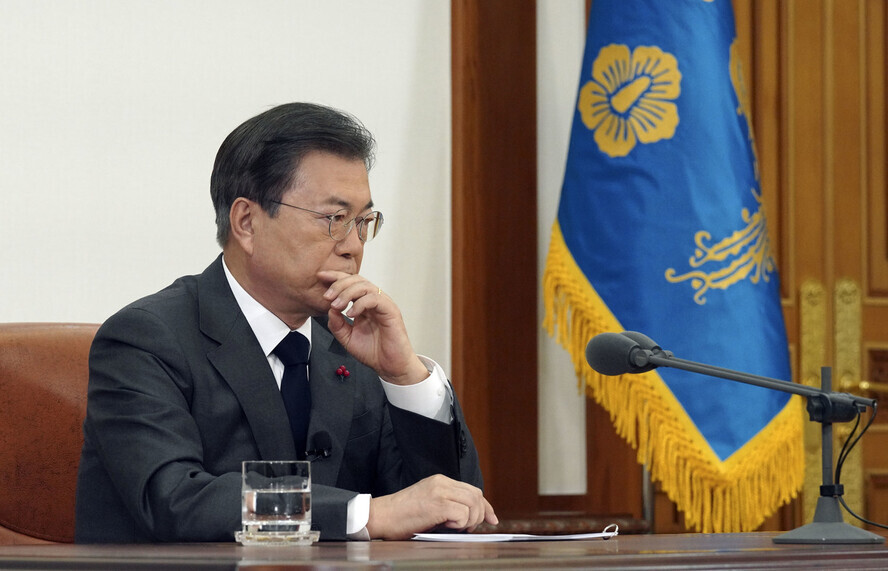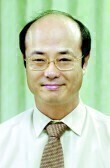hankyoreh
Links to other country sites 다른 나라 사이트 링크
[Column] How to stop the judicialization of politics

On Dec. 24, The Seoul Administrative Court (SCA) held a second hearing on South Korean Prosecutor General Yoon Seok-youl’s request for an injunction on his two-month suspension.
Based on two hearings, a senior judge at an administrative court will determine the appropriateness of disciplinary procedures approved by the Ministry of Justice, recommended by the justice minister, and executed by the president.
The South Korean Constitution grants the president two official titles: a “Head of State” who “represent[s] the State vis-a-vis foreign states,” and that of leader of the executive branch. Exercising his authority to impose disciplinary action in accordance with the Act on Discipline of Prosecutors may be seen as acting as head of the executive branch. Even if the administrative court recognizes the injunction, it wouldn’t jeopardize the president’s status as head of state — at least in theory.
However, it would definitely deal a severe political blow to President Moon Jae-in, a court overturning a punishment that he signed off on. This stands to tarnish the prestige of the supreme authority invested with power by the public through election.
Leaving aside any question of who bears responsibility for things reaching this point, it is a very bad look.
On Dec. 23, Chung Kyung-shim, a Dongyang University professor and the wife of former Minister of Justice Cho Kuk, was sentenced to four years in prison. This is not a situation for rashly condemning the judiciary. In a state governed by the rule of law, those who commit crimes face punishment. We’ll also have to watch to see what happens with the appeal.
Yoon may be pleased with this development, seeing it as justifying the investigation he has directed. But the allegations of impropriety surrounding Cho Kuk are a completely separate issue from prosecutors’ interference with the process of appointing a senior government official. Cho is Cho, and the prosecutors are the prosecutors. There should be no confusing the two.
The question of whether Cho’s appointment was appropriate was a matter to be determined through press scrutiny at the time. Had the prosecutors not intervened, Moon would most likely have withdrawn his nomination. If there needed to be an investigation of Cho and Chung by prosecutors, it should have been conducted at a later time.
The prosecutors have not interfered in ministerial appointments since the Cho fiasco turned everything upside down. Does this mean all the people appointed since then were utterly clean? That’s difficult to believe.
The same can be said for the ministerial candidates who have recently been undergoing National Assembly confirmation hearings. There are quite a few allegations the prosecutors could pin on them if they decided to. Joo Ho-young, the People Power Party (PPP) floor leader, said, “We’ve been making it clear that if they go ahead with appointing these candidates, we will have no choice but to pursue judicial procedures over the charges that emerge in the hearings.”
Exactly. Proceeding “according to the law” should always be a last resort. The prosecutors should be a step behind. Try as I might, I can’t make sense of the prosecutors launching a full-scale investigation of a ministerial candidate before their confirmation hearing has started. It gives the sense that some other reason must have factored in.
The inherent imperfections of democracyDemocracy is an imperfect system. The legislature, judiciary, and executive branch direct the national community amid a balance based on mutual checks and cooperation. But that system has been breaking down amid the confirmation bias and populism fanned by social media. It’s a global phenomenon.
Wherever you look, it’s become increasingly rare to see leading politicians meeting and shaking hands in the middle of the aisle. Opposing parties take every opportunity to launch accusations at each other. Politics are dragged into the courtroom. And amid all of this, the courts and prosecutors have been increasing their judicial authority.
The stature of the South Korean president is rapidly sinking. This could be seen as a backlash against the “imperial presidency” of the country’s dictator days — but the erosion in authority and stature has happened too quickly. It’s certainly true that the judiciary went overboard in its convictions of former Presidents Lee Myung-bak and Park Geun-hye. The courts in no way recognize the president as having “sovereignty.” Justified acts by past presidents could end up becoming “abuses of presidential power” in the future.
Moreover, the statute of limitations runs out during the president’s term — which means that they can be punished after leaving office for political actions during their presidency. We can’t just lambaste President Moon for “cowardice.”
What should be done? How can the “judicialization of politics” be stopped? It’s not an easy question to answer.
The realm of politics should be broadened. Ruling and opposition parties need to talk, compromise, and reach agreements. We should refrain from accusations and indictments. The president in particular is the most important politician of all. The president needs to talk and compromise and reach agreements with the opposition. Only by untangling the relationship between ruling and opposition parties can we hope to restore leadership within the administration.
We must not lose sight of the fact that jurists are not administrators. That is what makes the “judicial state” so dangerous. When the courts and prosecutors are calling the shots in state affairs, it’s a road to ruin for the country.

By Seong Han-yong, senior editorial writer
Please direct comments or questions to [english@hani.co.kr]

Editorial・opinion
![[Column] Season 2 of special prosecutor probe may be coming to Korea soon [Column] Season 2 of special prosecutor probe may be coming to Korea soon](https://flexible.img.hani.co.kr/flexible/normal/500/300/imgdb/original/2024/0426/3317141030699447.jpg) [Column] Season 2 of special prosecutor probe may be coming to Korea soon
[Column] Season 2 of special prosecutor probe may be coming to Korea soon![[Column] Park Geun-hye déjà vu in Yoon Suk-yeol [Column] Park Geun-hye déjà vu in Yoon Suk-yeol](https://flexible.img.hani.co.kr/flexible/normal/500/300/imgdb/original/2024/0424/651713945113788.jpg) [Column] Park Geun-hye déjà vu in Yoon Suk-yeol
[Column] Park Geun-hye déjà vu in Yoon Suk-yeol- [Editorial] New weight of N. Korea’s nuclear threats makes dialogue all the more urgent
- [Guest essay] The real reason Korea’s new right wants to dub Rhee a founding father
- [Column] ‘Choson’: Is it time we start referring to N. Korea in its own terms?
- [Editorial] Japan’s rewriting of history with Korea has gone too far
- [Column] The president’s questionable capacity for dialogue
- [Column] Are chaebol firms just pizza pies for families to divvy up as they please?
- [Column] Has Korea, too, crossed the Rubicon on China?
- [Correspondent’s column] In Japan’s alliance with US, echoes of its past alliances with UK
Most viewed articles
- 1AI is catching up with humans at a ‘shocking’ rate
- 2[Column] Season 2 of special prosecutor probe may be coming to Korea soon
- 3Is Japan about to snatch control of Line messenger from Korea’s Naver?
- 4‘We must say no’: Seoul defense chief on Korean, USFK involvement in hypothetical Taiwan crisis
- 5Up-and-coming Indonesian group StarBe spills what it learned during K-pop training in Seoul
- 6The dream K-drama boyfriend stealing hearts and screens in Japan
- 7[Column] ‘Choson’: Is it time we start referring to N. Korea in its own terms?
- 8Amnesty notes ‘erosion’ of freedom of expression in Korea in annual human rights report
- 9Is N. Korea threatening to test nukes in response to possible new US-led sanctions body?
- 10Division commander ordered troops to enter raging flood waters before Marine died, survivor says